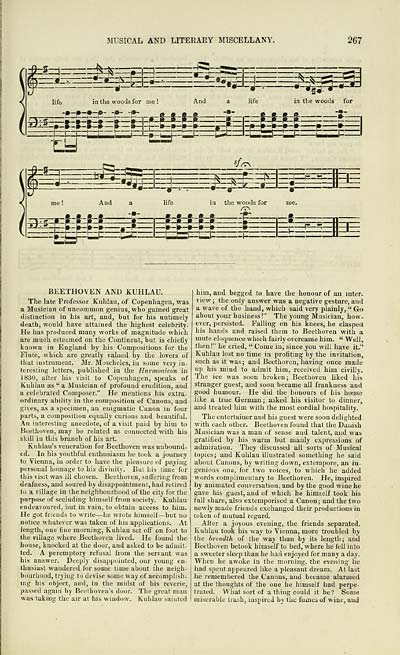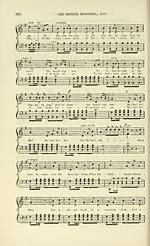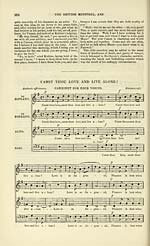Glen Collection of printed music > Printed music > British minstrel, and musical and literary miscellany
(959) Page 267
Download files
Complete book:
Individual page:
Thumbnail gallery: Grid view | List view

MUSICAL AND LITERARY MISCELLANY.
267
diz=\:
— |i*^ —
:5-
nz^
z^rssg^iril:
s
*^ii:
life in the woods for mo !
_-tzez?=e-_-£-_p-_,-,
And
life
in tbe woods for
rL-
^^^—-
felEg^^sS
*//.
:^S9E
SEz^
And
life
;^_|^ ^ il
^E=zz-l
in the woods for
g3EfE|Et!Efc=
EfefcfclElE
:E:
=t=l
-ta-'
=□=:
:=£::
:Li=P=!;;J=:
rp:
BEETHOVEN AND KUHLAU.
The late Professor Kuhlau, of Copenhagen, was
a Musician of uncommon genius, who gained great
distinction in his art, and, but for his untimely
death, would have attained the highest celebrity.
He has produced many works of magnitude which
are much esteemed on the Continent, but is chiefly
known in England by his Compositions for the
Flute, which are greatly valued by the lovers of
that instrument. Mr. Moscheles, in some very in-
teresting letters, published in the Harmonicon in
1830, alter his visit to Copenhagen, speaks of
Kuhlau as "a Musician of profound erudition, and
a celebrated Composer." He mentions his extra-
ordinary ability in the composition of Canons, and
gives, as a specimen, an enigmatic Canon in four
parts, a composition equally curious and beautiful.
An interesting anecdote, of a visit paid by him to
Beethoven, may be related as connected with his
skill in this branch of his art.
Kuhlau's veneration for Beethoven was unbound-
ed. In his youthful enthusiasm he took a journey
to Vienna, in order to have the pleasure of paying
personal homage to his divinity. But his time for
this visit was ill chosen. Beethoven, sufl'ering fi'om
deafness, and soured by disappointment, had retired
to a village in the neighbourhood of the city for the
purpose of secluding himself from society. Kuhlau
endeavoured, but in vain, to obtain access to him.
He got friends to write — he wrote himself — but no
notice whatever was taken of his applications. At
length, one fine morning, Kuhlau set oft' on foot to
the village where Beethoven lived. He found the
house, knocked at the door, and asked to be admit-
ted. A peremptory refusal irom the servant was
his answer. Deeply disappointed, our young en-
th\isiast wandered for some time about the neigh-
bourhood, trying to devise some way of accomplish-
ing his object, and, in the midst of his reverie,
passed again by Beethoven's door. The great man
was taking the air at his window. Kuhlau sahilcd
him, and begged to have the honour of an mter.
view; the only answer was a negative gesture, and
a wave of tlie hand, which said very plainly, " Go
about your business !" The young Musician, how-
ever, persisted. Falling on his knees, he clasped
his hands and raised them to Beethoven with a
mute eloquence which fairly overcame him. " Well,
then!" he cried, " Come in, since you will have it."
Kuhlau lost no time in profiting by the invitation,
such as it was; and Beethoven, having once made
up his mind to admit him, received him civilly.
The ice was soon broken; Beethoven liked his
stranger guest, and soon became all frankness and
good humour. He did the honours of his house
like a true German; asked his visitor to dinner,
and treated him with the most cordial hospitality.
The entertainer and his guest were soon delighted
with each other. Beethoven found that the Danish
Musician was a man of sense and talent, and was
gratified by his warm but manly expressions of
admiration. They discussed all sorts of Musical
topics; and Kuhlau illustrated something he said
about Canons, by writing down, extempore, an in-
genious one, for two voices, to which he added
words complimentary to Beethoven. He, inspired
by animated conversation, and by the good wine he
gave his guest, and of which he himself took his
full share, also extemporised a Canon; and the two
newly made friends exchanged their productions in
token of mutual regard.
After a joyous evening, the friends separated.
Kuhlau took his way to Vienna, more troubled by
the breadth of the way than by its length; and
Beethoven betook himself to bed, where he fell into
a sweeter sleep than he had enjoyed for many a day.
When he awoke in the morning, the evening he
had spent appeared like a pleasant dream. At last
he remembered the Canons, and became alarmed
at the thoughts of the one he himself had perpe-
trated. What sort of a thing could it be? Some
miserable trash, inspired by the fumes of wine, and
267
diz=\:
— |i*^ —
:5-
nz^
z^rssg^iril:
s
*^ii:
life in the woods for mo !
_-tzez?=e-_-£-_p-_,-,
And
life
in tbe woods for
rL-
^^^—-
felEg^^sS
*//.
:^S9E
SEz^
And
life
;^_|^ ^ il
^E=zz-l
in the woods for
g3EfE|Et!Efc=
EfefcfclElE
:E:
=t=l
-ta-'
=□=:
:=£::
:Li=P=!;;J=:
rp:
BEETHOVEN AND KUHLAU.
The late Professor Kuhlau, of Copenhagen, was
a Musician of uncommon genius, who gained great
distinction in his art, and, but for his untimely
death, would have attained the highest celebrity.
He has produced many works of magnitude which
are much esteemed on the Continent, but is chiefly
known in England by his Compositions for the
Flute, which are greatly valued by the lovers of
that instrument. Mr. Moscheles, in some very in-
teresting letters, published in the Harmonicon in
1830, alter his visit to Copenhagen, speaks of
Kuhlau as "a Musician of profound erudition, and
a celebrated Composer." He mentions his extra-
ordinary ability in the composition of Canons, and
gives, as a specimen, an enigmatic Canon in four
parts, a composition equally curious and beautiful.
An interesting anecdote, of a visit paid by him to
Beethoven, may be related as connected with his
skill in this branch of his art.
Kuhlau's veneration for Beethoven was unbound-
ed. In his youthful enthusiasm he took a journey
to Vienna, in order to have the pleasure of paying
personal homage to his divinity. But his time for
this visit was ill chosen. Beethoven, sufl'ering fi'om
deafness, and soured by disappointment, had retired
to a village in the neighbourhood of the city for the
purpose of secluding himself from society. Kuhlau
endeavoured, but in vain, to obtain access to him.
He got friends to write — he wrote himself — but no
notice whatever was taken of his applications. At
length, one fine morning, Kuhlau set oft' on foot to
the village where Beethoven lived. He found the
house, knocked at the door, and asked to be admit-
ted. A peremptory refusal irom the servant was
his answer. Deeply disappointed, our young en-
th\isiast wandered for some time about the neigh-
bourhood, trying to devise some way of accomplish-
ing his object, and, in the midst of his reverie,
passed again by Beethoven's door. The great man
was taking the air at his window. Kuhlau sahilcd
him, and begged to have the honour of an mter.
view; the only answer was a negative gesture, and
a wave of tlie hand, which said very plainly, " Go
about your business !" The young Musician, how-
ever, persisted. Falling on his knees, he clasped
his hands and raised them to Beethoven with a
mute eloquence which fairly overcame him. " Well,
then!" he cried, " Come in, since you will have it."
Kuhlau lost no time in profiting by the invitation,
such as it was; and Beethoven, having once made
up his mind to admit him, received him civilly.
The ice was soon broken; Beethoven liked his
stranger guest, and soon became all frankness and
good humour. He did the honours of his house
like a true German; asked his visitor to dinner,
and treated him with the most cordial hospitality.
The entertainer and his guest were soon delighted
with each other. Beethoven found that the Danish
Musician was a man of sense and talent, and was
gratified by his warm but manly expressions of
admiration. They discussed all sorts of Musical
topics; and Kuhlau illustrated something he said
about Canons, by writing down, extempore, an in-
genious one, for two voices, to which he added
words complimentary to Beethoven. He, inspired
by animated conversation, and by the good wine he
gave his guest, and of which he himself took his
full share, also extemporised a Canon; and the two
newly made friends exchanged their productions in
token of mutual regard.
After a joyous evening, the friends separated.
Kuhlau took his way to Vienna, more troubled by
the breadth of the way than by its length; and
Beethoven betook himself to bed, where he fell into
a sweeter sleep than he had enjoyed for many a day.
When he awoke in the morning, the evening he
had spent appeared like a pleasant dream. At last
he remembered the Canons, and became alarmed
at the thoughts of the one he himself had perpe-
trated. What sort of a thing could it be? Some
miserable trash, inspired by the fumes of wine, and
Set display mode to: Large image | Transcription
Images and transcriptions on this page, including medium image downloads, may be used under the Creative Commons Attribution 4.0 International Licence unless otherwise stated. ![]()
| Special collections of printed music > Glen Collection of printed music > Printed music > British minstrel, and musical and literary miscellany > (959) Page 267 |
|---|
| Permanent URL | https://digital.nls.uk/91446453 |
|---|
| Description | Scottish songs and music of the 18th and early 19th centuries, including music for the Highland bagpipe. These are selected items from the collection of John Glen (1833 to 1904). Also includes a few manuscripts, some treatises, and other books on the subject. |
|---|
| Description | The Glen Collection and the Inglis Collection represent mainly 18th and 19th century Scottish music, including Scottish songs. The collections of Berlioz and Verdi collected by bibliographer Cecil Hopkinson contain contemporary and later editions of the works of the two composers Berlioz and Verdi. |
|---|

